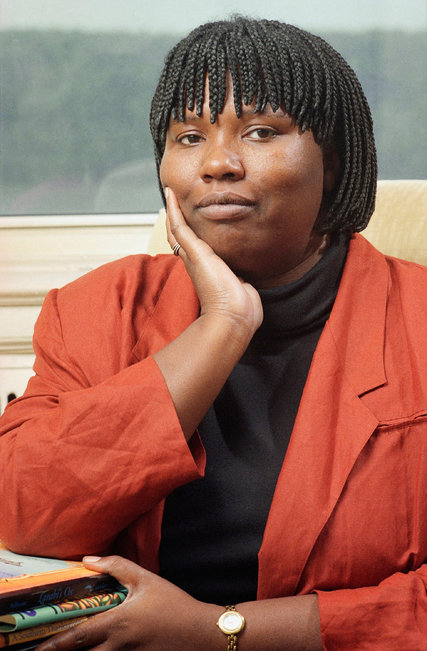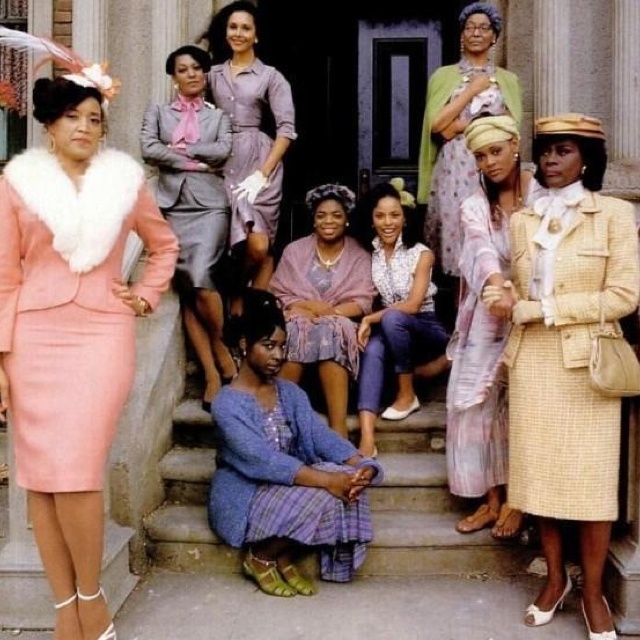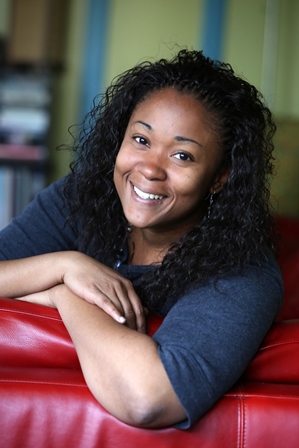On Gloria Naylor’s Transition: A Love Note
 On September 28, Gloria Naylor died of a heart attack while visiting the Virgin Islands at just 66-years-old.
On September 28, Gloria Naylor died of a heart attack while visiting the Virgin Islands at just 66-years-old.
I was just 7-years-old and in 3rd grade when I was introduced to Naylor on March 19, 1989, when Oprah Winfrey’s Harpo Productions produced a two-part miniseries for ABC based on her 1982 debut novel The Women of Brewster Place. The miniseries, like the novel, focuses on seven Black women (Mattie, Etta Mae, Lucielia “Ciel,” Melanie “Kiswana,” Cora Lee, Lorraine, and Theresa) and their experiences. And for this momentous occasion, Oprah put together an all-star Black cast, including herself, Paul Winfield, Cicely Tyson, Moses Gunn, Mary Alice, William Allen Young, Lynn Whitfield, and many others. I realize it may be difficult for some to understand why I would refer to a TV show as “momentous” for this reason. After all, most of us probably watch or at least know of How to Get Away with Murder, Empire, Queen Sugar, Survivor’s Remorse, and so on. However, back in 1989, it had been almost 25 years since the first Black lead actor starred in a television drama (Bill Cosby on I, Spy). It had been over 10 years since another miniseries featuring a predominantly Black cast (Alex Haley’s Roots) aired on a major network. BET was only just approaching its 10th year of existence. A Black actor hadn’t yet won a Best Actress or Best Actor Award at the Golden Globes or the Oscars. Back in 1989, I remember my mom, her sisters, her mother, her friends, my father’s mother, and other women in my family vowing to tune into ABC for those two nights. And I remember watching and thinking about how powerful it was to see so many Black women on TV all at once. Black women talking with one another about being lesbians. Black women talking about being in love with Black men. Black women arguing about class disparity. Black women hiding the scars of intimate partner violence. Black women struggling with motherhood. Black women fighting slumlords. I thought I would only ever witness the power of Black women circles at the kitchen table in a loved one’s home or in the beauty shop. Now, here it was on TV for the world to see.
 A few years later, I fell in love with The Women of Brewster Place all over again when I read the novel. I also fell in love with Linden Hills (1985), Mama Day (1988), Bailey’s Cafe (1992), The Men of Brewster Place (1999), and 1996 (2005). I fell in love with the way Naylor wrote Black joy, pain, happiness, sadness, anxiety, depression, dancing, singing, fighting, love-making, and praying. I loved the way she wrote Black women’s voices. Their spirits. Their souls. Their hearts. I could hear my Aunt Pat, my Aunt Terry, my Aunt Tracy, and my Aunt Janet fussing at children, hollering at lovers, singing in the choir, laughing with girlfriends. I could hear hot combs sizzling, soap operas playing faintly behind pots and pans clinking, floor boards creaking, children playing Double-Dutch and “Mother, May I?” I could smell fish frying, Queen Helene’s, Murphy Oil Soap, cigarettes, sweet potato pie, and the smell of ponytails laced with Ampro frying in the microwave. Thank God for my late paternal grandmother, Marshene Regenia Odd, who kept Black women on her bookshelves so that I knew the tradition in which I was developing a self. Thank God for Gloria Naylor, who never let me forget it. As she noted when she accepted the National Book Foundation’s First Novel Award in 1983 for The Women of Brewster Place, “I wrote that book as a tribute to [my mother] and other Black woman who, in spite of the very limited personal circumstances, somehow manage to hold a fierce belief in the limitless possibilities of the human spirit.” I ask you, then, readers, to venerate her memory and to breathe life into her now ancestral spirit by remembering and honoring her legacy.
A few years later, I fell in love with The Women of Brewster Place all over again when I read the novel. I also fell in love with Linden Hills (1985), Mama Day (1988), Bailey’s Cafe (1992), The Men of Brewster Place (1999), and 1996 (2005). I fell in love with the way Naylor wrote Black joy, pain, happiness, sadness, anxiety, depression, dancing, singing, fighting, love-making, and praying. I loved the way she wrote Black women’s voices. Their spirits. Their souls. Their hearts. I could hear my Aunt Pat, my Aunt Terry, my Aunt Tracy, and my Aunt Janet fussing at children, hollering at lovers, singing in the choir, laughing with girlfriends. I could hear hot combs sizzling, soap operas playing faintly behind pots and pans clinking, floor boards creaking, children playing Double-Dutch and “Mother, May I?” I could smell fish frying, Queen Helene’s, Murphy Oil Soap, cigarettes, sweet potato pie, and the smell of ponytails laced with Ampro frying in the microwave. Thank God for my late paternal grandmother, Marshene Regenia Odd, who kept Black women on her bookshelves so that I knew the tradition in which I was developing a self. Thank God for Gloria Naylor, who never let me forget it. As she noted when she accepted the National Book Foundation’s First Novel Award in 1983 for The Women of Brewster Place, “I wrote that book as a tribute to [my mother] and other Black woman who, in spite of the very limited personal circumstances, somehow manage to hold a fierce belief in the limitless possibilities of the human spirit.” I ask you, then, readers, to venerate her memory and to breathe life into her now ancestral spirit by remembering and honoring her legacy.
Heidi R. Lewis is an Assistant Professor of Feminist & Gender Studies at Colorado College and an Associate Editor for The Feminist Wire whose work primarily focuses on Feminist Theory, Critical Race Theory, and Critical Media Studies. Her essay “An Examination of the Kanye West’s Higher Education Trilogy” was published in The Cultural Impact of Kanye West, and her article “Let Me Just Taste You: Lil Wayne and Rap’s Politics of Cunnilingus” was recently published in the Journal of Popular Culture. She is also the author of forthcoming essays that examine FX’s The Shield, VH1’s Love & Hip Hop, and Bravo’s Married to Medicine. She has given talks at Kim Bevill’s Gender and the Brain Conference, the Educating Children of Color Summit, the Motherhood Initiative for Research and Community Involvement, the Gender and Media Spring Convocation at Ohio University, the Conference for Pre-Tenure Women at Purdue University, and for the Kampagne für Opfer Rassistischer Polizeigewalt in Berlin. She has also been a contributor to Mark Anthony Neal’s NewBlackMan, NPR’s “Here and Now,” KOAA news in Colorado Springs, and KRCC radio (the Southeastern Colorado NPR affiliate), Bitch Media, Racialicious, and Act Out. Heidi and her husband, Antonio, live in Colorado Springs with their two children, AJ and Chase, their cat Max, and their dog Philly. Learn more by following Heidi on Twitter at @therealphdmommy and by visiting her FemGeniuses website.





Pingback: A Tribute to Gloria Naylor: Teacher of Black Feminism